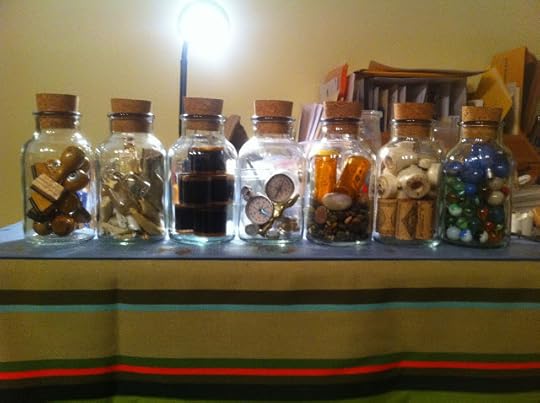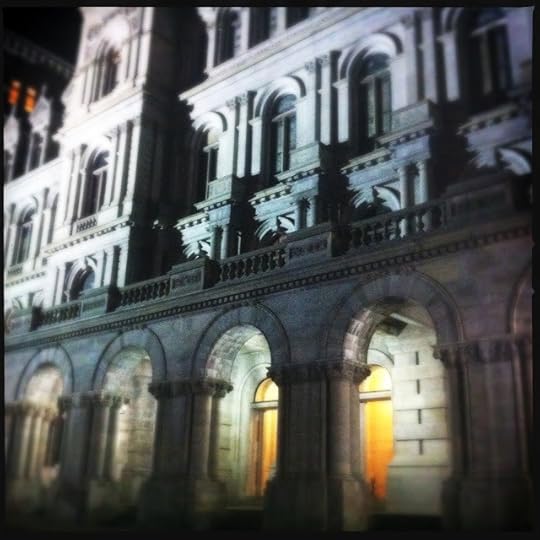Tony Tony Dohr's Door
 Geof Huth, "Every Poem Ever Written: Numbers 4 through 10 in Progress" (10 February 2012)
Geof Huth, "Every Poem Ever Written: Numbers 4 through 10 in Progress" (10 February 2012)Everything is structure or disorder, order or chaos, and the poet learns to work in both realms at once. The poet must learn to create order but allow disorder to roam within it. Because poets understand that, their verbo-visual works interest me more than those of artists. An artist will write something obvious and expect us to appreciate the irony of the wording. A poet will write something ambiguous and expect us to appreciate the inability to understand if the poet is ironic or not.
So it is that I began work on a massive expansion of my poem in progress, "Every Poem Ever Written."
I love that title, for reasons that I had explained to Anne Gorrick a few days ago:
She had no comment on these words. But Douglas Rothschild (AKA Tony Dohr on Facebook) did.
I was thinking of a future publication as a book of photos of my jar poems, which I conceived, long ago, as a long poem. I've already given away the title: Every Poem Ever Written, which has a bit of pomposity to it, but which is supposed to refer to how objects have poetic power when we are focused on the right collections or presentation [of] them.
While sitting in McGeary's Irish Pub tonight, and even earlier now that I think of it, Douglas told me that my chosen title was a bad one, that I would turn off half my readership ("Two people!" I thought) by using that title, and he urged me to use "The Romantic Canon" as a title. And by "urged," I mean "demanded," because Douglas is nothing if not opinionated.
Strangely, I don't care if people have opinions different from mine, especially whenever I can do whatever I want anyhow. He said that the title showed I was full of myself and that he didn't want me to be full of myself as another poet he knew was. (Okay, I'll keep that person's name secret, though he may be somehow associated with the Language poets.) I told him that two things were at play: 1. I am not full of myself. I understand my limitations are many and my effects on others are few, so I am not conceited enough to think I could write every poem ever written, but that is the reason I can write "Every Poem Ever Written." And I told him that the objects in the poems extended the poems into a representation of the world as a whole, that as part of the world they represented the entirety of it. Synechdoche we call it. I lived there once.
All of this drove Douglas (who forgot, as I did, to get me that mummified bat he'd promised me) batty. He argued that these objects didn't include samples of everything in the world, which demonstrated that he didn't understand the usefulness of synechdoche (wherein merely one object could represent the world). But I stood firm. I liked his title quite a bit, but I didn't want to take something he had designed (that title). I wanted my own title, and I wanted something that challenged the reader/viewer, something that would throw that person off kilter.
Douglas was also with me when I was filling seven jars with objects I had collected for many years. Think about this: I have been collecting many strange objects for decades, with no purpose to the collection except that, someday, I would use them in a "project." Now, the project, as if a complete surprise, is here, and I am working on it with deliberate speed, as if my life depended on it (as if any life depended on poetry, depended on art). While watching me fill these jars, deliberately but tentatively (because I was experimenting, I was checking), Douglas frequently had opinions and spouted them, and I agreed with him often, though usually only because I had already noted what he had. It's just that I had done so quietly.
I had, by mid-evening, assembled seven good starts to these object poems (most without words so far), and later tonight I assembled an eighth start, so I am eleven sections into this long poem as objects. And I realized something strange: I loved that these poems are more beautiful than the scattered pieces they only until recently were, and I loved that putting these pieces in this jars neatened the mess that preceded them. I loved that these poems were carefully structured, but also dependent on aleatoric modification, that they were not stable unitary constructions. I loved that they were alive.
After sitting in a bar for a few hours, Douglas and I walked past the state capitol (unlike most and maybe all other state capitols) and across the Empire State Plaza, which is one grand monument to mid-century boring architecture, but which is still impressively monumental, and which has become something I like, even something like home. The moon was a vague hazy disk behind the cover of clouds, and it was all beautiful.
So my thanks to Douglas for a night out, and remember what I told my friend Nico Vassilakis:
We don't have to be great poets. We have to be dedicated ones.
And so we are.
 New York State Capitol (11 February 2012)
New York State Capitol (11 February 2012)ecr. l'inf.
Published on February 10, 2012 22:21
No comments have been added yet.



